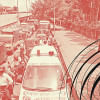With Ramadan returning, should classes be online?

With the entire country preparing for Ramadan and all the trials and tribulations this month will bring, discussions surrounding the logistics of how companies and educational institutions will keep functioning has once again sprung up. For universities, class timings have shifted in order to let students off early – as is the norm.
However, this does little to dissuade most students from the worry of having to spend miserable hours commuting under a blazing hot sun. Last year was particularly horrendous, with traffic congestion everywhere resulting in an abysmal time for many who have spent hours fasting and are merely looking to get home. With this in mind, the question arises: can these classes not be managed online?
Now, this question itself invites many responses. Many will be quick to bring up how online learning can be inefficient and that more frequent power outages in Ramadan may prove to be another hindrance. However, the truth of the matter is that for those who have to commute for an hour just to get to classes which have already been shortened due to Ramadan, the journey will be pointlessly exhausting and will leave little room for any sort of self-study or engagement in activities outside of academics. Not to mention, sleeping patterns get wildly disrupted during Ramadan, and asking for the same level of focus in class, while also staying on top of any assignments and lab reports all while running on an empty stomach is almost torturous.
The tradeoff, then, is to resort to online classes. At this point, being wary of online learning makes little sense as the world has adjusted rather efficiently to make space for it in the past few years. While even I would prefer being in person for my lectures, there is no doubt in my mind that my now hour-long commute will soon turn into a two-hour long journey just to get to my university, and the thought of it fills me with anxiety. How I will keep track of my academics while making sure to help prepare iftar at home is now a worry I must combat – and while I'm sure that worry has been normalised, part of me wonders if this really is the optimal way to continue.
Another facet to this, of course, is that recent developments with the Metro Rail have certainly helped in alleviating traffic. But even that is only for a certain section of the city, the rest will have to slog through a never-ending nightmare taking place under the sun. To top that off, since most offices and institutions will let off at roughly the same time, the congestion will not get any better for the entirety of the month. If classes were online, would that not also help alleviate the situation with the congestion?
When we speak of learning being efficient, it is important to remember that the traffic in Dhaka city really works against everyone. Expecting productivity and active learning on an empty stomach, all while battling traffic and the heat, makes little and little sense. Even the faculty members who spend hours delivering lectures with no hydration should realise how inefficient all of this actually is. March is, for many universities, a month of high academic pressure to ensure a smooth and efficient flow of academic progress, should online classes not be considered?

 For all latest news, follow The Daily Star's Google News channel.
For all latest news, follow The Daily Star's Google News channel. 







Comments